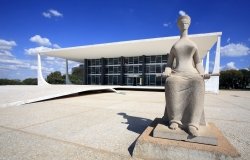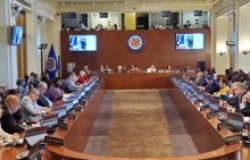Few Options for Resolution in Venezuela
Whether discontent with crime, violence, and the current state of the economy can be translated into broad anti-government sentiment is still open to question, writes Eric Olson.
After a month of constant street protests in Venezuela a number of things are becoming increasingly clear.
Opposition unity is being challenged.
For the past several years, forces in opposition to chavismo have sought to build a broad unified coalition behind a common strategy most visible in the political movement known as the Mesa de Unidad Democrática (MUD) – the Democratic Unity Roundtable. Its logic was to allow for competition among opposition forces but to ultimately unite behind a single candidate to challenge chavismo via national elections. Previous attempts by the opposition in 2002 and 2003 to use public protests, boycotts, and an attempted coup to overthrow the government had previously traumatized the nation leaving the opposition weaker and then-President Hugo Chávez and chavismo, stronger.
While the opposition’s electoral strategy enjoyed some success – resulting in the defeat of Chávez’s constitutional reforms in 2007 and keeping opposition forces together, its ultimate goal of defeating chavismo at the ballot box has thus far failed. A high-water mark for the MUD came in the snap April 2013 presidential elections called after President Chávez’s death from cancer. Efforts by Chávez and his party (PSUV) to orchestrate the transition, coupled with growing public disillusionment with economic and security conditions in the country, and a weak official candidate – Nicolás Maduro – resulted in a razor thin victory (+1.5 percent) for Maduro and chavismo, leading many to believe the election was possibly stolen and the opposition on the cusp of breaking through. Those hopes were dashed 8 months later when the results of local elections showed continued opposition strength in major urban areas but the spread between chavismo and the opposition increasing to approximately 6 percent.
The disappointing showing in December 2013, coupled with a 2 year hiatus in elections, raised questions within the opposition coalition about an election-focused strategy. In the past few weeks student leaders, not formally part of the MUD coalition, took to the streets in university towns like San Cristobal and Mérida to protest high crime rates, consumer shortages and the high cost of living. Those opposition leaders within the MUD coalition who generally favoured a more confrontational approach seized on the opportunity to support student demonstrations and launch a Twitter-based effort via #lasalida (the exit) to call for the Maduro administration’s exit from power.
The efforts of opposition stalwarts Leopoldo López, Maria Corina Machado, and Antonio Ledezma to capitalize on the student protests also sought to tap into growing discontent among Venezuelans about worsening economic and security conditions. They called for a broader protest movement and strategy that would potentially break through where elections had failed, especially during an extended period without elections.
Whether the latest opposition strategy proves successful depends on three things:
1) It will need to show momentum that moves beyond the anger and frustration of those already opposed to the chavista agenda. Whether discontent with crime, violence, and the current state of the economy can be translated into broad anti-government sentiment is still open to question. Discontent is widespread and growing, but not all of it is directed toward the government. Many among Maduro’s political base do not identify with the protesters, who rightly or wrongly are perceived as representing middle and upper class interests. The fact that protests in Caracas have been primarily in the eastern (comparatively wealthier) part of the city is indicative of these perceptions. The government’s narrative that economic hardships and insecurity are the fault of a greedy economic class and external pressures, including from the United States, remains persuasive in the eyes of many Venezuelans, so popular discontent is not universally directed at the government.
2) The protestors’ success also depends upon whether the government’s harsh response will alienate some of its own supporters by deepening the country’s political polarization while failing to address the underlying justifiable grievances of Venezuelans eager for security, stability, and an economy that works. Thus far, the government is pursuing a three-part strategy by vilifying the opposition and protesters, holding out the possibility of a peaceful resolution via dialogue, and moving slowly to modify currency restrictions and potentially opening up imports that Venezuelans are desperately seeking. But at some point Maduro’s government will have to face difficult policy choices to address inflationary pressures and reduce public insecurity or run the risk of alienating its own supporters.
3) The opposition will need to overcome its own internal differences and move beyond a strategy of protest alone. So far their refusal to dialogue on the government’s terms may be reasonable but also runs the risk of sounding uncompromising to a discontented public unhappy with current conditions, but also wary of embracing an opposition with no clear alternative agenda. By contrast the government has been able to diffuse the opposition by taking minimal steps to ease economic pressures, reducing and controlling media and social media spaces that might otherwise rally public support for the opposition, and convincing many that the problems are the result of American greed and hegemonic interests.
What role for the international community?
Finally, it is worth noting that the international community has struggled to define an appropriate response to the current crisis in Venezuela. There is understandable concern in the region, especially among neighbouring countries, regarding the humanitarian risks of widespread instability in Venezuela as well as the potential negative impacts on oil markets and subsidies that several Caribbean and Central American nations depend on.
Others nations such as Panama, Chile, and Paraguay, have reportedly quietly raised concerns about undemocratic practices and allegedly serious human rights violations in Venezuela including growing limits on independent and international press, and violent actions by elements of the Bolivarian National Guard (GNB) and armed groups – so-called colectivos – with strong government sympathies if not direct ties.
Nevertheless, how these concerns are dealt with when it involves a democratically elected government with significant popular support presents a challenge for the international community.
The Organization of American States has debated the Venezuelan question in its Permanent Council but has not reached a consensus. Several Andean countries are clearly concerned about developments in a neighbouring country, but while some have expressed alarm about the violence and potential instability none has directly criticized the Venezuelan government or called for some form of international intervention or mediation.
Meanwhile, countries such as Ecuador, Bolivia, and Nicaragua are part of the regional Bolivarian Alliance (ALBA) launched by Hugo Chávez, and express strong support for the Maduro government and condemned “undemocratic” efforts in Venezuela and abroad to interfere in the country’s affairs. Venezuela and its regional allies have sought to block further consideration of the issue in the Permanent Council, although an infrequent private session of the Permanent Council took place at OAS headquarters on March 6th lasting 8 hours. With no consensus emerging a second private session was scheduled for the 7th.
Given the different views expressed in the region, OAS Secretary General, José Miguel Insulza, has placed the focus back on Venezuela, calling for dialogue, and recognizing that both government and opposition have legitimate concerns and only dialogue among Venezuelans will reduce tensions and diffuse the risk of growing violence and instability.
Meanwhile, Venezuela has proactively sought to bring its case to the Union of South American Naitons (UNASUR). It has calculated that UNASUR represents a more sympathetic audience than the OAS because it includes several ALBA countries and excludes the United States and Canada, as well as Panamá who has allegedly pushed for regional action on Venezuela within the OAS. UNASUR did not initially accede to the Venezuelan request but is not scheduled to hold a Foreign Minister’s meeting during the presidential inauguration of Chile’s Michele Bachelet on March 11. The outcome of the UNASUR minister’s meeting or the OAS Permanent Council meeting are impossible to predict given the diversity of opinion in the region.
According to Paulo Sotero, Director of the Wilson Center’s Brazil Institute, Brazil might represent the regional actor with the greatest possibility for influence given the governing Workers Party’s “Bolivarian inclinations.” But the initial Brazilian response has been described as “timid” especially when compared to the strong criticism expressed by the Brazilian foreign ministry to developments in the Ukraine – an event over six thousand miles away. Some of the reticence may reflect efforts to protect the significant Brazilian investment in Venezuela. Yet as Venezuelan protests continue, Brazil appears to be shifting its messages slightly to encourage both sides in the Venezuelan crisis to talk to one another.
As in many internal conflicts a peaceful resolution is both essential and illusive. The more the international community can insist that Venezuelans themselves find a basis for dialogue and compromise, the better for the country and the region.
About the Author

Eric L. Olson
Director of Policy and Strategic Initiatives, Seattle International Foundation

Latin America Program
The Wilson Center’s prestigious Latin America Program provides non-partisan expertise to a broad community of decision makers in the United States and Latin America on critical policy issues facing the Hemisphere. The Program provides insightful and actionable research for policymakers, private sector leaders, journalists, and public intellectuals in the United States and Latin America. To bridge the gap between scholarship and policy action, it fosters new inquiry, sponsors high-level public and private meetings among multiple stakeholders, and explores policy options to improve outcomes for citizens throughout the Americas. Drawing on the Wilson Center’s strength as the nation’s key non-partisan policy forum, the Program serves as a trusted source of analysis and a vital point of contact between the worlds of scholarship and action. Read more









